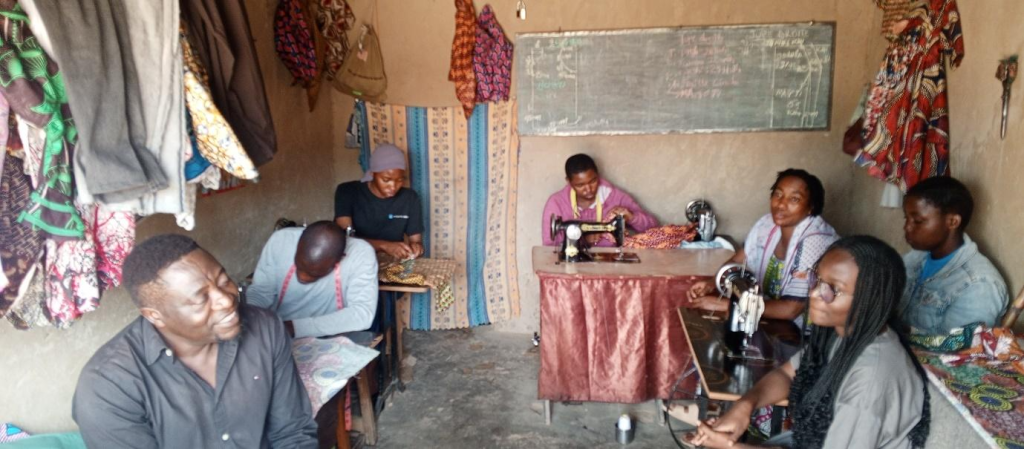
From Micheal and Jenny in Rwamwanja
In the heart of Rwamwanja refugee settlement, in a small village called Kasisa, Basecamp 2, lives a quiet but remarkable couple; Mr. Bisimwa Mufambali and his wife, Ms. Fifi Balisesa. Their story is not one of large grants or official recognition, but of agency, humility, and the power of doing what you can with what you have.
Their journey began in 2020, at the height of COVID-19 restrictions. With markets closed and movement restricted, Mufambali and Fifi decided to put their tailoring skills to use. They bought a sewing machine and began making face masks. Word spread quickly, and soon the community knew them as expert tailors. One local CBO even contracted them to produce masks.
From this work, they told us: “We made a lot of money to the extent that we were able to roof our own house with iron-sheets and remove the UNHCR-donated tarpaulins.”
But when COVID-19 restrictions eased, they noticed something deeper: a shortage of skilled tailors, and at the same time, many teenage girls in the settlement; out of school, idle, some already with children; struggling without options. “We felt we could share our skills with these groups,” they explained.
So, they opened their home. Literally. They converted their small sitting room into a tailoring training space. The first group was nine vulnerable girls. Training was free. Instead of charging fees, the couple encouraged trainees to sell the clothes they produced, so they could earn and stay motivated. When that group graduated, another cohort came, and then another.
Today, their sitting room continues to function as a small training center. Every Saturday, even those who have finished training but cannot afford machines return to use Mufambali and Fifi’s equipment to stitch, repair, or redesign clothes for clients. The couple treats them like their own children.
Their pride shines when they recount that even their two biological children, trained in tailoring, are now working in Kampala. Some of their trainees have also moved to the city, earning income from the very skills they learned in that humble sitting room.
When Jenny, my ‘Trust Circle’ Colleague, and I had gone with to visit them, asked why they do all this, their answer was disarmingly simple:
“We couldn’t sit and watch these children suffer when we could do something. Everywhere we went—churches, streets—young people would approach us asking to learn tailoring. We saw their struggles and decided, as a family, to help.”
And help they do, in ways that have humbled us. Because they cannot afford full meals for their trainees, they buy sugarcane, which the young people chew for lunch before resuming their sewing. I couldn’t help but reflect: in my home, food often goes to waste; yet here, sugarcane; day after day, week after week; is accepted with gratitude, even joy.
Their dreams are modest but urgent:
- To expand their training room.
- To invest more in their backyard poultry project for eggs and income.
- To farm their small plot of land, so trainees can have real meals instead of sugarcane.
- To buy more sewing machines, so graduates can become independent.
They have not registered as a CBO. The cost is too high, they told us. Better to buy sugarcane for lunch than pay for papers. They have not sought partnership with refugee-led organisations either. “Most CBOs have their own people,” they said. “They may not work with you, even if you are skilled. Often, they give opportunities to friends or tribemates.”
Their story reminded us that beyond the world of registered CBOs, donor partnerships, and polished reports, there are ordinary people quietly carrying the burden of their communities. People like Mufambali and Fifi. People who choose service over recognition. People who remind us that community agency does not always come with a letterhead or an official stamp.
For us in the Trust Circle, this was a reckoning. We have walked past their house many times. Yet it took intentional listening, and a referral from another refugee community member, to finally discover their work. It is a reminder that even in displaced communities, there are layers of gatekeeping; between the educated and the uneducated, the registered and the unregistered, the recognised and unrecognised. And often, philanthropy stops at the gates of formal organisations, never reaching families like Mufambali’s, whose agency is as real; if not more; than any institution’s.
So the question for philanthropy, and for all of us, is this:
How can giving evolve to recognise, center, and sustain the voices and efforts of people like Mufambali and Fifi; those who do what they can, with what they have, for those who need it most? Surely, that is the truest of humanitarianism.
Our Trust Circle engagements are challenging us to search for answers. We believe that in stories like this lie not just lessons, but possibilities for a different way of supporting communities.
The journey continues. Will you be part of it?

Leave a Reply